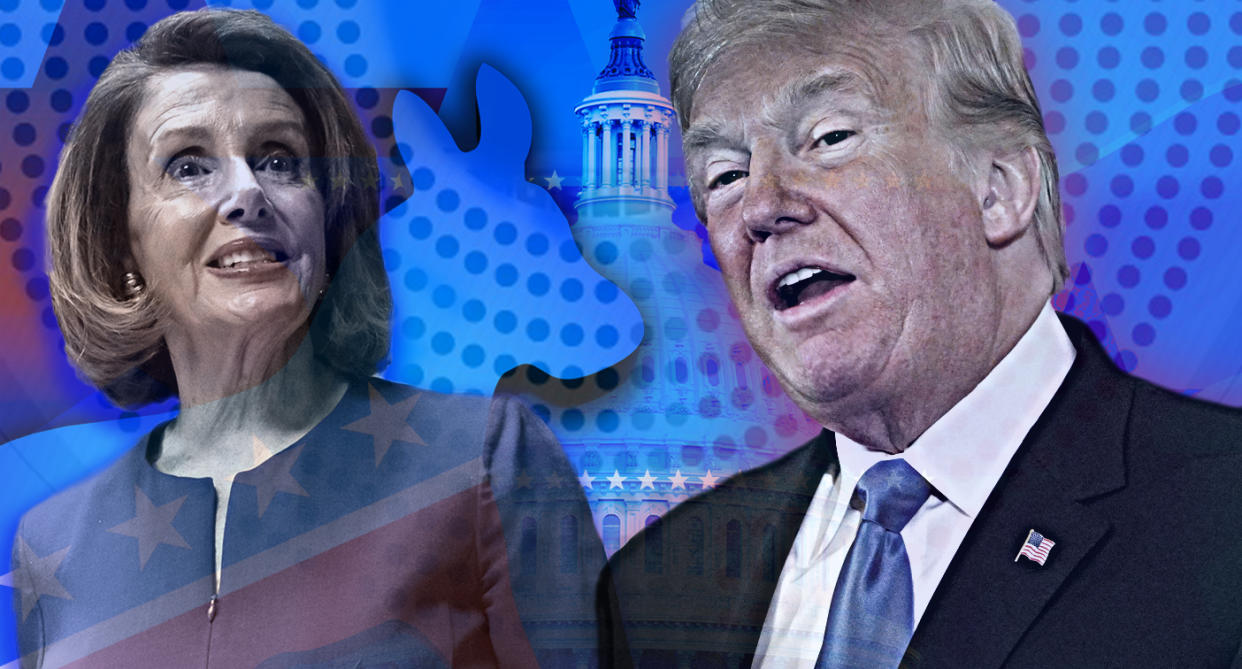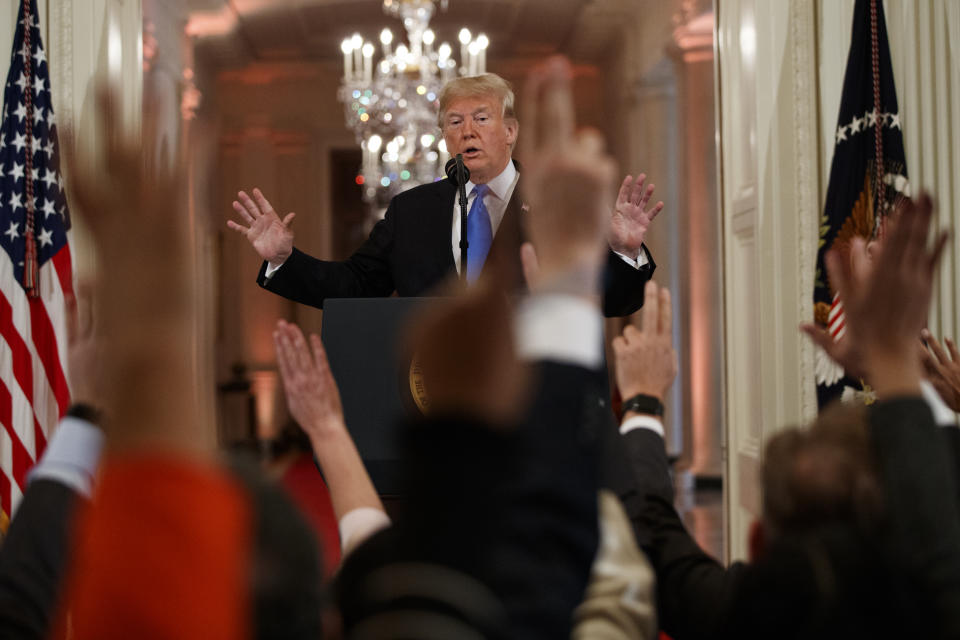What the Democrats will do with control of the House

The Democratic Party capitalized on anger toward President Trump to unite progressive and moderate voters and win back control of the House of Representatives on Tuesday. These strands of the Democratic coalition have different demands and expectations from the leadership they just elected.
The 116th Congress, which will be sworn in on Jan. 3, 2019, is expected to act as a check on Trump during the final two years of his current term in the White House.
There’s precedent from other recent midterm elections. In 1994, Republicans flipped the House by focusing on allegations of scandals in the Clinton administration. In 2006, George W. Bush’s unpopular Iraq War and lackluster Hurricane Katrina response led Democrats to a sweeping victory in the House and Senate, as well as a majority of state governorships and state legislatures. In 2010, the tea party movement’s disdain for Barack Obama’s health care plan catapulted the Republicans to big victories. If history is any indicator, Democrats will be appealing for cooperation from the other party, while digging in their heels on legislation. During the last two years of Republican control of the House, little or nothing of the Democratic agenda even came to the floor for a vote.
Democrats in Congress are being encouraged by the party’s left wing to hammer the Trump administration with nonstop hearings and investigations, but to keep their majority they will also need to address issues that more directly affect the American people. After riding enthusiasm from progressives to victory, they cannot drift too far left if they want to hold onto the swing voters needed to win back the White House in 2020.
Democratic leaders are already promising a new era of bipartisanship, but experts expect them to pursue all sorts of legislation that has little chance of passing the Republican-controlled Senate or get signed into law by Trump: strengthening gun control, reforming immigration, undoing GOP tax cuts, and shoring up the Affordable Care Act (Obamacare).
House Minority Leader Nancy Pelosi said Wednesday that the availability and cost of health care was the most important issue in the campaign for American families.
“When we put together our ‘For the People’ agenda, our first priority was to lower health care costs by lowering the cost of prescription drugs,” Pelosi said at a press conference on Capitol Hill.
According to Pelosi, Democrats in Congress will fight for good-paying jobs, invest in American infrastructure, and ensure the integrity of government by reducing the role of “dark money” in the political process.
“That was our agenda. Our candidates ran with it. But health care, health care, health care in every household in America is an important issue,” she continued.

Julian E. Zelizer, a professor of history and public affairs at Princeton University, said presenting these proposals will be a way of directing the conversation and setting the agenda for the next presidential election. He said Democratic proposals will hint at what they would actually accomplish if they manage to win control of the White House and both houses of Congress in 2020. He doesn’t have much hope for big bipartisan legislation.
“I think the leadership coming in will feel emboldened and part of the mandate will be a check on the president, so if Speaker Pelosi — assuming she will be the speaker — reaches a point where the president for some reason has reached out to her, it would be very hard given how her party feels to all of a sudden give him legislation that he can brag about,” Zelizer told Yahoo News.
The identity of the new Democratic House speaker is uncertain, because many Democratic candidates in this year’s midterms distanced themselves from Pelosi in an effort to appeal to more moderate voters. Especially for freshman representatives, it’s unlikely they will want to begin their tenure by breaking such a central promise.
Zelizer said it’s equally unlikely that Trump will suddenly become amenable to cross-party dialogue and compromise.
“That’s not what he’s about. He’s very clear that he will govern as a partisan. He’s not going to move to the center. I think the dynamics for both of them push against bipartisanship. That’s my sense,” Zelizer said.
Matthew Dallek, a political historian at George Washington University, has similar expectations for the new Congress. He said in addition to the strong oversight Democrats will apply to Trump and his Cabinet over his tax returns, alleged corruption and Russia’s interference in the 2016 election, the Democrats will pass legislation with messaging around health care, anti-corruption initiatives, and jobs. He said these will “ultimately be statements of principle and symbolic” but that it’s conceivable that Democrats will seek common ground on discrete issues such as trade, opioids, infrastructure or veterans affairs.
“I would not expect an outbreak of bipartisanship, of course, and it would be surprising if House Democrats were able to reach agreements on major issues with Trump’s White House,” Dallek told Yahoo News. “Still, the Democrats may have some incentive, politically and ideologically, to demonstrate that they are serious about governing and working in select areas to move the country forward.”
Of course, the possibility of impeachment is an issue. Some prominent Democrats like Rep. Maxine Waters, R-Calif., who won her reelection by a landslide, and billionaire activist Tom Steyer have called for Trump’s impeachment. But this is an extremely delicate issue and Democrats would need to build a compelling case slowly before presenting it to the American people. According to CNN’s national exit polls, 40 percent of midterm voters — and 77 percent of self-identified Democrats — would support impeachment.
Ron Klain, a Democratic operative who served as a senior White House aide for Presidents Barack Obama and Bill Clinton, wrote in an op-ed in the Washington Post that the House majority should dedicate its first 100 days to five pieces of legislation: a bill to raise the federal minimum wage to $15 and restore overtime pay protections, a bill to strengthen Obamacare, a bill to restore the Voting Rights Act and fight GOP voter suppression, an infrastructure bill without pork, and a bill that grants legal status to DACA recipients, often called “Dreamers.”

“Yes, this leaves much still undone. Child care. Job training. College assistance. Criminal-justice reform. Campaign finance reform. And so much more. These are important, too. But Democrats need a focused agenda of quickly actionable items for the first 100 days,” Klain wrote. “After that, they will have at least another 630 days in control of the House — and plenty of time for investigations.”
There is a hunger among liberals for the newly elected 116th Congress to hold Trump accountable for corruption in his administration that the outgoing 115th Congress brushed off. But pushing too hard too soon could open the Democrats up to accusations of scandal-mongering and hyper-partisanship — the same charges leveled at the Republicans during the Benghazi controversy. If Democrats focus more on partisan points than substantive issues, they may end up bolstering their support among the more ideological faction of their party at the expense of the middle, which helped them in this election, and thus compounding political polarization.
_____
Read more from Yahoo News:
The CIA’s communications suffered a catastrophic compromise. It started in Iran.
Ending the Qatar blockade might be the price Saudi Arabia pays for Khashoggi’s murder
How Robert Mercer’s hedge fund profits from Trump’s hard-line immigration stance
Trump’s target audience for migrant caravan scare tactics: Women



